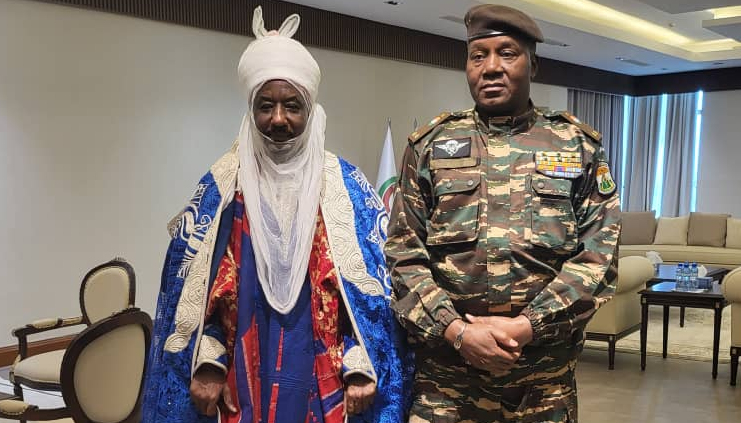Former Emir of Kano, Alhaji Muhammadu Sanusi, renowned as the 14th Emir of Kano, has engaged in a significant diplomatic effort by meeting with the leaders of the coup in Niger Republic.
This move comes against the backdrop of heightened tensions following the junta’s cancellation of a crucial meeting with representatives from key bodies, including the African Union (AU), the Economic Community of West African States (ECOWAS), and a senior US diplomat.
Despite efforts by a delegation assembled by ECOWAS to mediate and find a peaceful resolution, the military rulers declined to engage in discussions.
In an unexpected twist, Alhaji Muhammadu Sanusi, who formerly held the position of governor at the Central Bank of Nigeria (CBN) and commands a notable following within the Tijjaniya sect, emerged as a central figure in this diplomatic scenario.

Footage surfaced on Wednesday depicting Alhaji Muhammadu Sanusi, a prominent figure with influence not only due to his past positions but also due to his Tijjaniya sect’s extensive following in Niger.


It is noteworthy that Damagaran, the third-largest city in Niger, assumes significance in this context.
Insider sources indicate that Alhaji Muhammadu Sanusi embarked on this journey with the objective of fostering negotiations with the coup leaders.

It is revealed that this endeavour was undertaken in his personal capacity, yet with the knowledge and backing of President Bola Tinubu. President Tinubu’s concerns regarding the escalating impasse and the potential adverse consequences on the relationship between Nigeria and Niger, as well as the well-being of citizens in both nations, played a pivotal role in Sanusi’s mission.

This development unfolds on the eve of a crucial meeting among leaders of ECOWAS, set to convene in Abuja. President Bola Tinubu, who holds the mantle as ECOWAS Chairman, strategically scheduled this gathering following the expiration of a 7-day ultimatum issued by the regional bloc for the reinstatement of President Mohamed Bazoum.
In response to Niger’s political situation, GOVIMA reported that ECOWAS had wielded sanctions as a tool and hinted at the possibility of employing military measures. However, such an approach encountered resistance, particularly resonating within Nigeria’s borders.

